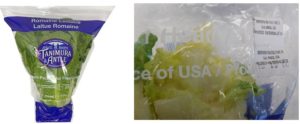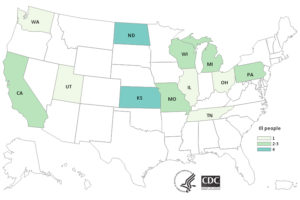As of November 9, 2020, a total of 12 people infected with the outbreak strain of E. coli O157:H7 have been reported from six states.

Illnesses started on dates ranging from September 2, 2020, to October 14, 2020. Ill people range in age from 8 to 62 years, with a median age of 21 years. Sixty-seven percent of ill people are female. Of 11 ill people with information available, 5 have been hospitalized. No deaths have been reported.
Illnesses might not yet be reported due to the time it takes between when a person becomes ill and when the illness is reported. This takes an average of 2 to 4 weeks. Please see the Timeline for Reporting Cases of E. coli O157 Infection for more details.
On November 6, 2020, Tanimura & Antle recalled packaged single head romaine lettuce after the Michigan Department of Agriculture and Rural Development (MDARD) identified E. coli O157:H7 in a sample of the packaged romaine lettuce. WGS results showed that the E. coli strain in the romaine lettuce sample was closely related genetically to the E. coli strain identified in ill people.

State and local public health officials are interviewing ill people to determine what they ate and other exposures in the week before they got sick. Of the 11 people interviewed, all reported eating various types of leafy greens, including romaine lettuce (5), spinach (5), iceberg lettuce (3), and red leaf lettuce (3).
There is not enough epidemiologic and traceback information available at this time to determine if ill people got sick from eating Tanimura & Antle romaine lettuce. The investigation is ongoing to determine if additional products may be contaminated with the outbreak strain of E. coli.

Do not eat, sell, or serve Tanimura & Antle’s recalled packaged single head romaine lettuce.
 Tanimura & Antle Inc. is voluntarily recalling its packaged single head romaine lettuce under the Tanimura & Antle brand, labeled with a packed on date of 10/15/2020 or 10/16/2020, due to possible contamination with E. Coli 0157:H7. Packages contain a single head of romaine lettuce with the UPC number 0-27918-20314-9. No other products or pack dates are being recalled. There have been no reported illnesses associated with the recalled product.
Tanimura & Antle Inc. is voluntarily recalling its packaged single head romaine lettuce under the Tanimura & Antle brand, labeled with a packed on date of 10/15/2020 or 10/16/2020, due to possible contamination with E. Coli 0157:H7. Packages contain a single head of romaine lettuce with the UPC number 0-27918-20314-9. No other products or pack dates are being recalled. There have been no reported illnesses associated with the recalled product.

 Up from last months count of 39 , the CDC announced today that a total of 51 people infected with the outbreak strain of E. coli O103 were reported from 10 states – Idaho, Utah, Wyoming, Texas, Iowa, Missouri, Illinois, Florida, Virginia and New York.
Up from last months count of 39 , the CDC announced today that a total of 51 people infected with the outbreak strain of E. coli O103 were reported from 10 states – Idaho, Utah, Wyoming, Texas, Iowa, Missouri, Illinois, Florida, Virginia and New York. Seventeen (63%) of 27 people interviewed reported eating sprouts at a Jimmy John’s restaurant. Jimmy John’s LLC reported that all of their restaurants stopped serving clover sprouts on February 24, 2020. Clover sprouts are no longer available at Jimmy John’s restaurants.
Seventeen (63%) of 27 people interviewed reported eating sprouts at a Jimmy John’s restaurant. Jimmy John’s LLC reported that all of their restaurants stopped serving clover sprouts on February 24, 2020. Clover sprouts are no longer available at Jimmy John’s restaurants. As of February 25, 2020, 14 people infected with the outbreak strain of E. coli O103 have been reported from five states.
As of February 25, 2020, 14 people infected with the outbreak strain of E. coli O103 have been reported from five states. Epidemiologic evidence indicates that sprouts from Jimmy John’s restaurants are a likely source of this outbreak.
Epidemiologic evidence indicates that sprouts from Jimmy John’s restaurants are a likely source of this outbreak.